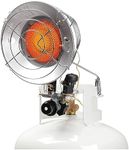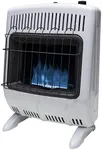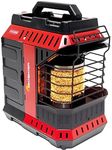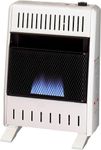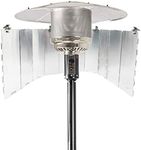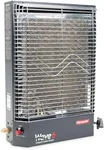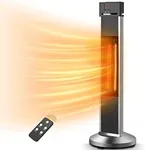Buying Guide for the Best Portable Gas Heater
Choosing the right portable gas heater involves understanding your heating needs, the space you want to heat, and the features that will provide you with the most comfort and safety. Portable gas heaters are convenient for providing warmth in various settings, but it's important to select one that matches your specific requirements. Here are some key specifications to consider when making your decision.Heating CapacityHeating capacity is measured in British Thermal Units (BTUs) and indicates how much heat the heater can produce. This spec is crucial because it determines how effectively the heater can warm up your space. For small rooms or personal use, a heater with lower BTUs (around 3,000-5,000) may be sufficient. For larger areas or outdoor spaces, you might need a heater with higher BTUs (10,000-20,000 or more). Consider the size of the area you need to heat and choose a heater with an appropriate BTU rating to ensure comfort.
Fuel TypePortable gas heaters can use different types of fuel, such as propane or butane. The fuel type affects the heater's performance, portability, and cost of operation. Propane heaters are generally more powerful and suitable for larger spaces or outdoor use, while butane heaters are often more compact and ideal for indoor use. Think about where you will be using the heater and how easy it is to access and store the fuel type you choose.
Safety FeaturesSafety features are essential to prevent accidents and ensure safe operation. Look for heaters with features like tip-over protection, which automatically shuts off the heater if it falls over, and oxygen depletion sensors, which turn off the heater if oxygen levels drop too low. These features are particularly important if you plan to use the heater in enclosed spaces or around children and pets. Prioritize heaters with robust safety mechanisms to ensure peace of mind.
PortabilityPortability refers to how easy it is to move the heater from one place to another. This spec is important if you need to frequently relocate the heater or use it in different areas. Consider the weight, size, and design of the heater. Lightweight and compact models are easier to carry and store, while larger models may offer more heating power but can be cumbersome to move. Choose a heater that balances portability with your heating needs.
Adjustable Heat SettingsAdjustable heat settings allow you to control the level of heat output, providing flexibility and comfort. This feature is important because it lets you customize the warmth according to your preference and the current temperature. Heaters with multiple heat settings can be more versatile, catering to different heating needs throughout the day or season. Look for models with easy-to-use controls and a range of settings to maximize comfort.
Energy EfficiencyEnergy efficiency indicates how effectively the heater converts fuel into heat. This spec is important for reducing fuel consumption and operating costs. Efficient heaters provide more heat with less fuel, making them more economical and environmentally friendly. Check for heaters with high efficiency ratings or features like thermostats that help maintain a consistent temperature without wasting fuel. Choose an energy-efficient model to save on fuel costs and minimize environmental impact.
